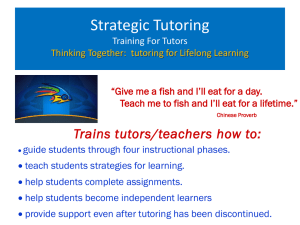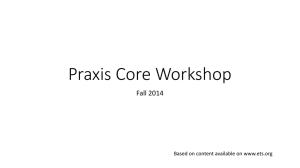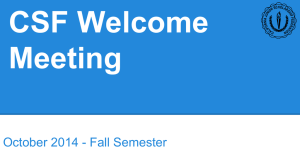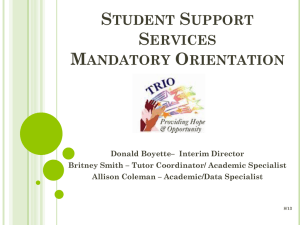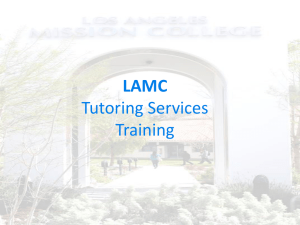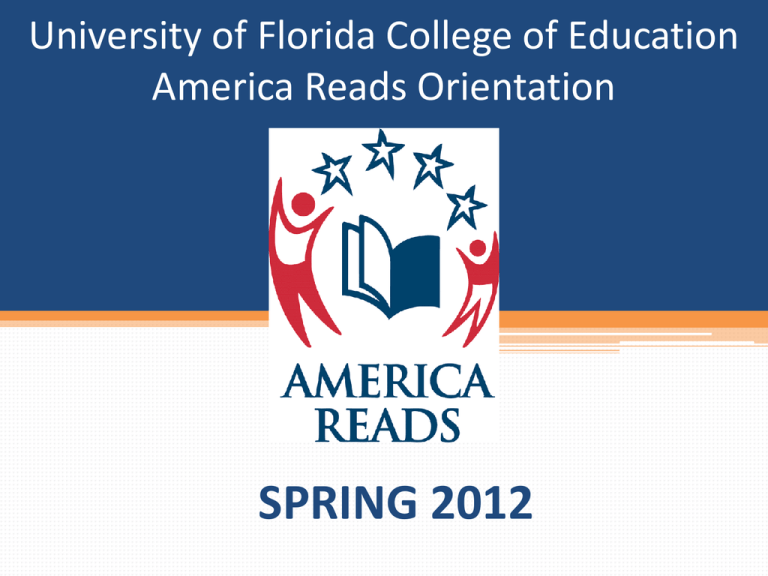
University of Florida College of Education
America Reads Orientation
SPRING 2012
What is America Reads?
• A grassroots effort to improve reading skills among
elementary school students in grades 1 through 3.
• Established in 1996 by the Clinton administration as
a Federal Work Study program.
• UF students eligible for work-study as part of
financial aid are trained as literacy tutors for
elementary children.
• Tutoring occurs in schools and community-based
after-school settings.
Topics to Cover
Program Structure and Contact Information
Tutor Preparation
Essential Components of a Standard Tutoring Model
Essential Components of an Alternative Tutoring Model
Time-Reporting and Pay Schedule
Our Expectations of Employees
Topics to Cover
Program Structure and Contact Information
Tutor Preparation
Essential Components of a Standard Tutoring Model
Essential Components of an Alternative Tutoring Model
Time-Reporting and Pay Schedule
Our Expectations of Employees
Program Structure
Penny Fultz
College of Education
AR Financial Coordinator
Natalie Chin
Office Manager
Dr. Holly Lane
America Reads Director
Rachel Parsons
Program Coordinator
Jennifer Tragash
Mentor Center Director
Micaela Thomas
Assessment Coordinator
Kelly Jensen
Harry Jones
City of Gainesville
Massey-Westside Center
Director
City of Gainesville
Northeast Center Director
Our Office
Norman Hall G504
Phone: 352-273-4171
E-mail: read@coe.ufl.edu
http://education.ufl.edu/Centers/AmericaReads/
Office hours will be sent to all tutors via email
***Always call to make sure someone is there before
you walk all the way to the office.
Topics to Cover
Program Structure and Contact Information
Tutor Preparation
Essential Components of a Standard Tutoring Model
Essential Components of an Alternative Tutoring Model
Time-Reporting and Pay Schedule
Our Expectations of Employees
Tutor Preparation
Before you begin your tutoring session
1) Find a space for tutoring; sit side-by-side, rather than
across from each other. You are doing one-on-one tutoring.
2) Gather all materials needed for that lesson from the bin.
(When the lesson calls for big books or enlarged copies of
poems, you can use regular copies of the books and plain
paper).
3) Read the lesson plan and book – note any variations
needed (as mentioned above).
4) Have Prompting Guide ready and available.
5) Note the writing students will be doing. Put the
corresponding lesson number and date on the writing
pages.
Managing Your Time
Carefully consider your weekly schedule.
Establish good communication with the people in the
site where you are working.
Choose a location to work that is away from
TV/video/games/playground.
Before a session begins you will have 15 minutes to
gather your tutoring materials and organize them so that
you are ready to go.
Following your tutoring session you will have 15 minutes
to respond and reflect about your tutoring session. At
this time, a ‘session notes’ form should be filled out.
Topics to Cover
Program Structure and Contact Information
Tutor Preparation
Essential Components of a Standard Tutoring Model
Essential Components of an Alternative Tutoring Model
Time-Reporting and Pay Schedule
Our Expectations of Employees
Essential Components of a Standard
Tutoring Model
Overall, sessions should take about 40 minutes
1. Re-Reading a familiar book (~5 minutes)
2. Word work (~5 minutes)
3. Reading a new book (~10 minutes)
4. Writing (~10 minutes)
5. Extension activity (~5 minutes)
Some Great Tips!
Encourage critical thinking!
- Ask them the questions and give them chance to
answer. The more you listen to them, the more you
can see and understand their thought processes.
Write and write and write some more!
- Allow students to express themselves through their writing. Help
them with their grammar and punctuation, but dont harp on it.
Perfection is not the goal.
Teach academic success skills!
- Students need help staying organized and learning how to effectively
study for a test.
Become an advocate!
- Ask them about their day in school, ask them about their favorite
subject(s) and the ones they struggle with. Help them understand its
ok to ask for help and show them some ways they can ask for help.
Topics to Cover
Program Structure and Contact Information
Tutor Preparation
Essential Components of a Standard Tutoring Model
Essential Components of an Alternative Tutoring Model
Time-Reporting and Pay Schedule
Our Expectations of Employees
Respect Cultural Differences
1. Pay attention to your students’ accents and
pronunciation.
2. If your student pronounces words differently than
you, do not try to “correct” his or her accent.
3. Our students have to switch codes all the time. We
don’t need to make it harder for them.
Getting to Know You…..
Topics to Cover
Program Structure and Contact Information
Tutor Preparation
Essential Components of a Standard Tutoring Model
Essential Components of an Alternative Tutoring Model
Time-Reporting and Pay Schedule
Our Expectations of Employees
Time-Reporting and Pay Schedule
You will be paid on a bi-weekly basis.
Please sign-in and out every day that you work. Be sure to have
your site host and site coordinator verify your hours for that
day.
Timesheets that are not filled out correctly or do not have all of
the required signatures will not be picked up. This will result in a
pay delay.
America Reads staff will do our best to make sure that you get
paid on time; however,
• Inputting your time late or incorrectly can result in
pay delay until the following pay period (if the mistake
is fixed).
Timesheets and Hours
Minutes will be rounded to the nearest quarter hour.
• 53-07 round to 0
• 08-22 round to 15
• 23-27 round to 30
• 38-52 round to 45
For example, if you came in at 11:24 you will put down 11:30.
There is more information on reporting your hours in the “Time
Reporting Done Right” document.
***Falsifying your hours is immediate grounds for
termination***
Topics to Cover
Program Structure and Contact Information
Tutor Preparation
Essential Components of a Standard Tutoring Model
Essential Components of an Alternative Tutoring Model
Time-Reporting and Pay Schedule
Our Expectations of Employees
Our Expectations of All Employees
Follow through on your commitments – this may only be a
couple hours a week for you, but for the site and the children,
it’s a big deal. Be consistent, dependable, and responsible.
Dress, behave, and speak accordingly – you are a role model
to the children and you are representing UF. Be respectful of
the school, teachers, and the children.
Be positive – remember you are making a huge difference in
the lives of the children, even if some days are frustrating.
Be honest – if you need help, don’t be afraid to ask or let us
know.
What to Wear? Dress Code
Dress conservatively, professionally, but comfortably.
Good rules to follow:
x See-through and revealing garments, tank and halter tops
are NOT ALLOWED.
x Clothing with writing or symbols advertising or promoting
drugs, tobacco, alcohol, sex, etc. are NOT ALLOWED.
x Phones, i-pods, iphones, etc. should not be used during the
tutoring sessions.
x Jewelry and accessories (including piercings) should be
professional.
x Any visible tattoos should be covered.
Attendance and Program Policies
If you are going to miss work, you MUST contact the
following people at least 24 hours in advance:
1. Site Host
2. Site Coordinator
3. Office Staff
*At least one week notice will need to be given for academic or
extracurricular related conflicts.
*Contact Information will be available before you leaving this evening.
Please write all information down, as you will be responsible for
having it.
How many excused absences allowed? No more than 3
How many unexcused absences allowed? 0
Attendance: Days Off
1/20/2012: Teacher Workday
2/20/2012: Presidents’ Day
3/5/2012-3/9/2012: UF Spring Break
3/30/2012: Teacher Workday
4/2/2012-2/6/2016: AC Spring Break
* Last day of tutoring TBD
Book Check-out Procedure
Every tutor will be responsible for checking out their
own books for tutoring sessions
Books will be checked out every other week
This includes both LLI books and chapter books
Every book will be signed in and out by the tutor needing it
If you have not finished with a book in the two weeks, you
will need to come in to the office to ‘renew’ the checkout
Each tutor will receive an extra hour of pay every two
weeks for completing this. Failure to bring your own
timesheet into the office will result in no extra pay.
Other Program Policies
As an America Reads tutor, it is just as important to
exercise responsibility and professionalism as it is for
you to strive to be a great tutor.
This includes:
Having strong communication with the office, Site Host,
and Site Coordinator
Address every encounter (including face to face, phone, or
via email) with an America Reads employee with respect
and professionalism
Fulfilling book check-out procedures as required (biweekly)
Expectations of All Employees
As explained previously, all America Reads
employees should treat their position with the
utmost level of responsibility and professionalism.
Should an employee fail to uphold this value system,
a recorded reprimand will be made by the office.
After two reprimands, the employee will be asked
into the office for a re-evaluation meeting.
Should problems persist after this meeting, the
employee will be immediately terminated.
You MUST have completed the
following to begin tutoring:
1.
2.
3.
4.
5.
Application
Fingerprinting
Read the Employee Manuel
Read “Time-Reporting Done Right”
Attend orientation training
Thank you for coming!
Feel free to contact us at the America Reads office if you have
any questions, comments, or concerns:
Norman Hall G504
Phone: 352-273-4171
E-mail: read@coe.ufl.edu

